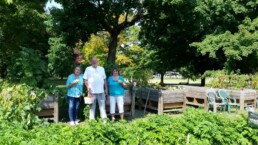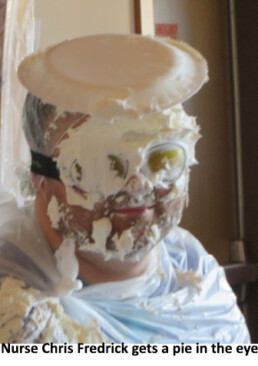Healthy Aging Month: How to Embrace Feeling Older
Here’s a question to ponder during Healthy Aging Month: What is “old?”
Statistically, the median age is 37.8, so when you pass that mark, you are older than 50% of people. But studies show that people don’t start feeling old until their 60s, and in a recent poll, respondents said 68 was the average age when old age begins.
So what? Christopher Mele, writing in The New York Times, explores the journey into old age with several experts, who offer perspective and advice. Take it seriously, they say, with good planning and a sense of realism. But don’t get caught up in the stereotypes. Embrace what’s working and learn to compensate for what’s not.
As one expert sagely put it: “What is the alternative to aging? It’s dying young.”
–
Healthy Aging Month was started 20 years ago to draw attention to the myths of aging. The observance encourages adults 45+ to re-invent themselves and improve their physical, mental, social and financial well-being.
Healthy Aging Month: Advice for Kids Good for Older Adults Too
Some advice on getting older: Listen to what your pediatrician told you when you were a kid.
Ecumen Names Three Vice Presidents
Ecumen has named three vice presidents.
William (Bill) McGarry has been named vice president of IT & chief technology officer (CTO) with leadership responsibility for company-wide information systems and technology. He joins Ecumen from Trissential, a management consulting firm. Previously, he was CIO at St. Jude Medical, International CIO at Owens Corning, Vice President of Enterprise Applications at Medronic, Vice President of Business Transformation at Smiths Medical and Global Integration Leader of IT e-Business at General Electric. McGarry has a Bachelor of Arts degree in Business Administration from Lourdes University in Sylvania, Ohio.
Amy Korzenowski has joined Ecumen as vice president of operations for housing and nursing home communities. Korzenowski has extensive experience in strategic management and leadership of total quality of care initiatives in senior services. Previously, she was assistant vice president of clinical operations at Prime Therapeutics, a Minneapolis pharmacy benefit management company. Prior to that, she served in multiple operations leadership roles with Extendicare Health Services and Volunteers of America National Services. Korzenowski has a Master of Science degree in Health and Human Service Administration from St. Mary’s University in Minneapolis and a Bachelor of Arts degree in Aging Services from the University of Minnesota.
Brett Anderson has been promoted to vice president of nursing services, leading Ecumen-wide healthcare services with responsibility for ensuring quality, consistency, and regulatory compliance. Brett began his career at Ecumen in 2014 as the Clinical Director at Ecumen Centennial House in Apple Valley after serving as an Ecumen graduate student intern. He was promoted to the role of Regional Nursing Consultant in 2016. Before joining Ecumen, Brett served as an Adjunct Instructor at Minnesota State University in Mankato and as an Instructor at Saint Paul College. Brett was appointed by Governor Mark Dayton to serve on the Board of Trustees for the Minnesota State College & Universities System from 2011-2013. He has a Master of Science degree in Nursing Leadership and Management from Metropolitan State University and a Bachelor of Science degree in Nursing from Minnesota State University in Mankato. He is a Registered Nurse, a certified Public Health Nurse and board-certified Nurse Executive.
September Is Healthy Aging Month: 10 Tips To Reinvent Yourself
Healthy Aging Month, celebrated each September, is a time to focus attention on the positive aspects of growing older.
Take a Lesson from a Charming 91-Year-Old Who’s Going on 15
Meet Flossie Lewis, a charming 91-year-old who’s crippled on the outside but feels 15 on the inside.
Most Centenarians Feel Positive — And a Lot Younger Than They Are
UnitedHealthcare has been polling centenarians annually for the past nine years, and the studies document that the 100+ age group is overall happy, well adjusted and not burdened with regrets.
This year’s study, summarized in USA Today, finds that centenarians on average feel about 83. (Baby boomers also were surveyed this year, and on average a 65-year-old feels 55.)
Most centenarians did not expect to live to 100, and most baby boomers do not expect to reach that age. Both say that attitude and physical health are equally important to reaching 100.
Full study results are available here.
How Does This Amazing 94-Year-Old Woman Set World Athletic Records?
Olga Kotelko is off-the-charts amazing. She took up track and field at age 77 and at age 94 she holds 26 world records including age-group bests in the high jump, the hammer throw and the 200-meter run. But how did she do that? And how is she aging so well?
Writer Bruce Grierson wanted to find out and got Olga’s cooperation to work with him because, as he put it: “Whatever was happening with her was the opposite of what was happening to me.” Together they consulted researchers in gerontology, exercise physiology and genetics looking into the mystery of Olga’s youthfulness. It turns out she is neither a genetic freak nor a health nut.
Read about what makes Olga run in this summary of Grierson’s book on The New York Times “Well” blog.
Secrets to 75 Years of Marriage and a Final Goodbye on Valentine's Day
 A 75-year love story will forever change today. Clifford and Mildred Bjerke of Moorhead, Minn., married in the 1930s and raised a fun-loving family based on their simple ideals of love, family and hard work. Not uncommon in those days, but few are able to reach the 75 year milestone.
A 75-year love story will forever change today. Clifford and Mildred Bjerke of Moorhead, Minn., married in the 1930s and raised a fun-loving family based on their simple ideals of love, family and hard work. Not uncommon in those days, but few are able to reach the 75 year milestone.
The grandparents of one of my best friends, I’ve witnessed the legacy Clifford and Mildred created – generations of Bjerkes who carry on the “spunk” that kept Clifford on his toes and the hard work that held their family together. Their daughter, at age 70, makes me laugh out loud at her stories and admire her funky new haircut and bright red dress. Their granddaughter, my friend, is not only the life of the party, but also works long, emotional hours as a neonatal nurse practitioner.
It’s both heart-warming and heart-breaking that Clifford and his family say goodbye and lay Mildred to rest today, Valentine’s Day 2013, just days after sharing their love story with The Forum of Fargo-Moorhead. It’s my honor to pass along Clifford and Mildred Bjerke’s secrets of 75 years of marriage.
Ecumen receives $3 million Margaret A. Cargill Foundation grant
SHOREVIEW, Minn. (February 5, 2013) – Ecumen, a non-profit that provides senior housing and services across Minnesota and nationally, announced today it has received a $3 million grant from the Margaret A. Cargill Foundation.
The grant will help transform a longstanding nursing home at Ecumen Detroit Lakes into a one-stop aging services hub that improves and expands service access for seniors in rural Becker County, Minnesota. The goal is to develop a replicable model that maximizes existing community infrastructure, integrates technology, and combines services in one location to help seniors remain healthfully independent in rural America.
Rural America Larger Than Most Nations
If rural America were a country, its population of 50 million would be larger than nearly all of the world’s nations. Rural America’s fastest growing population cohort is people 65-plus. Seniors make up 15 percent of the country’s rural populace, with the proportion of seniors greater in rural areas than metropolitan areas. Overall, rural residents have proportionately more chronic conditions than their urban counterparts, but obtaining services that can help a person remain independent can be difficult in rural areas, especially for seniors, many of whom live alone.
“We are honored by this opportunity to carry out Margaret A. Cargill’s philanthropic vision, especially as it relates to transforming aging services and serving unmet needs,” said Kathryn Roberts, president and CEO of Ecumen. “Our goal is to help keep people healthier and out of the nursing home and hospital. This initiative will take a whole-person approach and create a community hub that helps integrate technology, socialization, fitness, nutrition and health care. Society has long looked at aging as a challenge. We believe growing older represents one of our country’s great innovation opportunities.”
Ecumen has commenced design work on the new center on the Ecumen Detroit Lakes campus, which includes a mix of housing and services for seniors. Construction is anticipated to begin in the Spring and conclude in 2014. Components will include:
- A telehealth center for physicians, nurses and other health care professionals to conduct patient consultations
- Thirty private rehabilitation suites for short-term stays, so area residents can rehabilitate after illness or surgery and then return home
- A warm-water pool for exercise classes and physical therapy.
- State-of-the art occupational therapy, speech therapy and physical therapy areas
- A fitness center with anaerobic and aerobic equipment, which can accommodate all strength levels
- A labyrinth area for meditation, prayer and reflection
- An internet café, library and classrooms for health workshops, classes and other social and educational opportunities
- A salon
- A dining area for up to 40 people
In most rural areas this mix of services doesn’t exist or is geographically scattered. A hub approach opens the door to making other community resources more accessible. For example, it can provide area physicians a partner in physical therapy, and care and patient health monitoring to better coordinate health information; transportation approaches can be focused on a single destination; and it can help better define and coordinate acute care and non-acute care services in the larger community.
Ecumen (www.ecumen.org), which is based in Shoreview, Minn., is the most innovative leader of senior housing and services, empowering people to live better, easier and more fun lives. Its mission is to create home for older adults wherever they choose to live. Ecumen envisions a world in which aging is viewed and understood in radically different ways. The Minneapolis/St. Paul Business Journal has identified Ecumen as one of Minnesota’s “Best Places to Work”, and the Minneapolis Star Tribune named Ecumen as one of Minnesota’s “Top 100 Workplaces”.
What You Can Expect From a Great Assisted Living Community
By Carol O'Dell, Caring.com contributing editor
Last updated: January 16, 2013
How will you find a good assisted living community for yourself or your loved one? A place that's affordable and safe, with excellent care, warm surroundings, and a friendly staff?
With more than 31,000 senior care facilities across the country, the good news is that there are lots of choices. The less-than-good news is that there are lots of choices! How do you begin your search? What do you look for -- and how do you know when you've found it?
Assisted living facilities have much to offer the aging population. From yoga classes to nature trails, movie nights to computer and painting classes, seniors will find something that entices them out of their apartments and into the many gathering places most facilities provide.
But it's not the indoor heated pools or fitness rooms that make for a good assisted living community -- it's when your loved one knows she belongs. It's when a staff member notices that something just isn't right and your loved one receives prompt attention. It's when other residents smile when they see her step into the dining room, or when you, the family member, know you can stop by at any time.
From coast to coast, in big cities and small towns and everything in between, there are some assisted living communities that truly shine. These are establishments that have inspired top-notch reviews from residents, experts, and families just like yours. These are the best of the best -- the Caring Stars of 2013.
Even though these providers are all over the country, it turns out that they have some important things in common. Here, we present five trends among Caring Star winners -- qualities that communities near you should have, too.
1. A clean, safe place where needs (big and small) are addressed promptly: "I feel heard."
Making sure your loved one is safe and receives prompt attention trumps the list. The best communities draw top-quality staff and keep communication open. In the words of one caregiver, they're "easy to contact and never hesitate to call if something needs to be discussed."
It's when everyone -- the director, the kitchen staff, the care aides and nurses -- goes out of their way and takes the time to do the little things that matter so much. Places where food requests are accommodated or that have “a chef who knows how to make the food sing.” Places where, as one family member said, the staff is "considerate and dependable, no matter when I call."
2. Homey touches: "It feels like home."
No one wants to feel like they're living in a hospital, and they don't have to. Assisted living communities have come a long way. They feature special touches, such as manicured grounds with flower beds, gazebos and ponds, inviting décor, and "spacious, well-maintained living spaces." Where living spaces reflect residents' personalities -- like the community where "residents had several of their personal belongings displayed, such as photographs and figurines." "Placing a loved one here will help me sleep at night," one visitor said of a two-time five-star community in his area.
3. A trustworthy staff and active residents: "It feels like family."
Trusting that your loved one is receiving good care is vital, and there's nothing like being greeted by name. These are the places where "you can feel the love when you walk in the door." It's also important that your loved one find new friendships. "Several residents stopped and talked to us. It was nice to know that my grandma wouldn't have a problem meeting people" is how one granddaughter expressed it.
4. Great amenities: "I feel like I'm on vacation."
You're in for treat when it comes to amenities. Assisted living communities now offer video, audio, and book libraries; computer rooms; and classes on everything from digital photography to scrapbooking. If you're into fitness, you can swim, golf, and even take a "laughing yoga" class. And don't think you're stuck in one place: After visiting a friend at her community, one reader said, "We walked the trails that lead to the park in the back. We ate lunch in the dining area (food was great) . . . then took the facility bus ride half a mile down to the mall for shopping."
You're likely to find whatever you're interested in, whether it's church services; game nights; a 24-hour café offering beverages and light snacks; or easy access to nearby shopping, museums, music venues, and restaurants.
5. Family-friendly atmosphere: "I feel like my family and friends are always welcome."
It's tough to place your loved one in a care community, so finding one that's family-friendly helps assure you that your loved one will stay connected. "Family involvement is encouraged, and there are special family nights several times during the year, with live music, festive decorations, and a beautiful buffet," one family member said of her experience with a loved one's assisted living community. Life is sweeter when you're able to invite a friend for lunch, and when your grandchildren and even the great-grands get to visit often. Some assisted living facilities send out invitations to special events and celebrations; you can even reserve a room for birthdays and other important gatherings.
Before choosing an assisted living community, gather as much information as you can. Be sure to go online and see if there are Caring Stars in your area, and read reviews for other communities as well. Then schedule a few tours of your top selections. Print out a copy of the Caring Checklist for evaluating assisted living providers so you can make notes as you go.
While you're there, talk to the staff (include a chat with someone from the kitchen staff, care aides, the activities director, and others) and be sure to meet a few residents and their visitors. Ask for a chance to enjoy a meal in the dining hall.
And, above all else, don't hesitate to ask each community: "How many of these Caring Stars trends are you getting right?"







